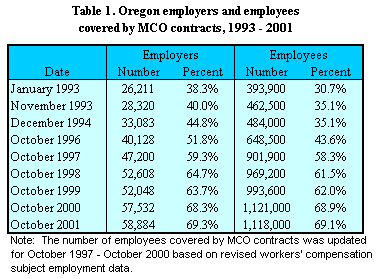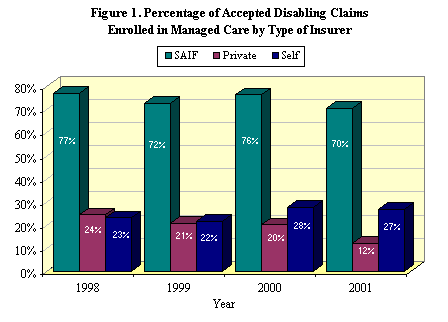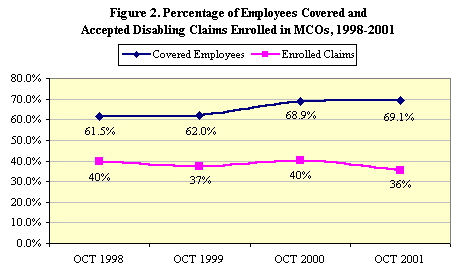
Coverage and Enrollment in Workers' Compensation
Managed Care Organizations in Oregon During 2001
![]()
by Nathan Johnson and Julie Sutton
The percent and number of Oregon employers covered by workers'
compensation managed care organizations (MCO) in 2001 increased slightly
from 68 percent (57,532) in 2000 to 69 percent (58,884) in 2001. This
represents a gain of over 1,300 employers covered by MCO contracts in
October 2001. The percent of Oregon workers remained approximately the
same as last year's estimates, with a drop of about 3,000 employees covered
by MCOs in October 2001.
In 2001, 36 percent (8,766) of accepted disabling claims were enrolled in MCOs, a drop from 40 percent in 2000. After injury, covered workers may be enrolled in managed care by their insurers. The insurers send the injured workers notification that they must seek future treatment, if any, from providers who are on the MCO's panel. Under SB 369, insurers may require injured workers to receive medical treatment in the MCO prior to claim acceptance. If the insurer denies the claim, however, the insurer must pay the costs of medical services until the worker receives notice of the denial. Insurers that do not enroll workers in an MCO are not required to pay medical services if the claim is eventually denied. As shown in Figure 1, the percentage of accepted disabling claims enrolled in managed care by SAIF and private insurers dropped in 2001, with self-insureds remaining at approximately the same level as 2000. The number of claims enrolled by SAIF fell from 76 percent in 2000 to 70 percent in 2001. As in 1999 and 2000, Oregon Health Systems (OHS) was the MCO with the largest number of SAIF enrolled claims (Table 2). And, consistent with previous years, a number of private insurers and self-insured employers enrolled a higher percentage of claims than SAIF. This situation most likely reflects the different manner by which insurers enroll workers - either immediately upon receiving the claim and paying all related medical bills on denied claims, or waiting until the claim is accepted. Also, geographic dispersion of employers and employees within the state may preclude some insurers from enrolling a higher percentage of their claimants.


The percentage of claims enrolled by private insurers fell from 20 percent in 2000 to 12 percent in 2001 (Figure 1). Liberty Northwest Insurance Corporation continued to enroll the largest number of claims (336) of any private insurer; however, the percentage of claims enrolled by Liberty dropped from 24 percent in 2000 to 9.5 percent in 2001. The MCO with the highest number of Liberty-enrolled claims in 2001 was First Health (278). Similar to last year, Fred Meyer enrolled the largest number of claims of any self-insurer in 2001 (327), representing 80 percent of their accepted disabling claims, a slight increase from 77 percent in 2000.
There were nine active MCOs in 2001 (COMCO became inactive March 15, 2001). Oregon Health Systems received the highest number of enrolled claims (2,924), about 33 percent of all enrollments in 2001. Managed Healthcare NW (2,241) and Providence MCO (2,129) had the second and third largest numbers, respectively. Both Managed Healthcare NW and Oregon Health Systems received over 90 percent of their business from SAIF, and together represent 78 percent of SAIF's enrolled claims in 2001. Providence MCO and First Health together represent over 70 percent of claims enrolled by all private insurance companies in 2001. In addition, Providence MCO represented 60 percent of the claims enrolled by all self-insured employers in 2001. The fourth and fifth MCOs most active in total enrollments were Kaiser Foundation Health Plan (713) and First Health Group Corporation (374), respectively.


If you have questions, about the information contained in this document please contact by e-mail or phone: Nathan Johnson, Research Analyst, (503) 947-7194 or Julie Sutton , Research Analyst, (503) 947-7349, Research & Analysis Section, Information Management Division.
The information in IMD publications is in the public domain and may be reprinted without permission.
In compliance with the Americans with Disabilities Act (ADA), this publication is available in alternative formats by calling (503) 378-4100 (V/TTY).